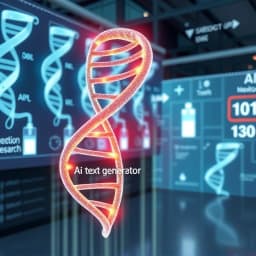
AI Text Generator for Medical Research Abstracts
Find this useful? Bookmark ( CTRL/CMD + D ) for quick access!
Try an example:
Clinical Trial Summaries
Systematic Review Abstracts
Case Study Overviews
Meta-Analysis Highlights
Research Proposal Abstracts
Conference Presentation Summaries
Explore Similar Tools
Recent Generations
Taco Bar Party Ideas
the amount paid directly to you. Yes it is possible in future cases to request direct payment to the provider, Rephrase and give me polished email.
Claim Email Template
we have processed the claim as per the attachments in the claim submission we have processedthe invoice for Saul Holding. We dont have invoice for the Salofalk.
Claim Email Template
this additional information is very important. this adiitional information was requested by our clinical team. Without clinical review claim not be paid so please share the below additional information
Ai Text Generator For Medical Research Abstracts
Ai Text Generator For Medical Research Abstracts is a powerful AI-powered tool designed to assist researchers in crafting concise and impactful abstracts for their medical studies. This innovative solution combines advanced natural language processing with a deep understanding of medical terminology to deliver high-quality, coherent abstracts that meet academic standards.
Key Capabilities
- Automated Abstract Generation: Quickly generate well-structured abstracts from detailed research papers, saving time and effort in the writing process.
- Customizable Templates: Utilize a variety of templates tailored for different medical fields, ensuring relevance and adherence to specific journal requirements.
- Contextual Understanding: Leverage AI's ability to comprehend complex medical concepts, resulting in abstracts that accurately reflect the essence of the research.
- Multilingual Support: Create abstracts in multiple languages, broadening the reach of your research and facilitating international collaboration.
Who It's For
Designed for medical researchers, academic institutions, and healthcare professionals, Ai Text Generator For Medical Research Abstracts excels in streamlining the abstract writing process. Whether you're preparing for a conference presentation or submitting to a peer-reviewed journal, this tool enhances your productivity and ensures clarity in communication.
Why Choose Ai Text Generator For Medical Research Abstracts
What sets Ai Text Generator For Medical Research Abstracts apart is its specialized focus on medical research, making it the ideal solution for producing high-quality abstracts that resonate with the scientific community.
Ready to transform your abstract writing process? Start using Ai Text Generator For Medical Research Abstracts today and experience the difference in clarity and efficiency!
Enhance Your Work with AI Text Generator for Medical Research Abstracts
Leverage the power of AI to streamline your tasks with our AI Text Generator for Medical Research Abstracts tool.
Automated Abstract Generation
Effortlessly generate concise and informative abstracts for your medical research papers using advanced AI algorithms.
Contextual Relevance
The AI tool ensures that generated abstracts are contextually relevant and aligned with the latest medical research trends and findings.
Citation Management
Easily manage and incorporate citations within your abstracts, ensuring proper attribution and enhancing the credibility of your research.
How AI Text Generator for Medical Research Abstracts Works
Discover the simple process of using AI Text Generator for Medical Research Abstracts to improve your workflow:
Input Research Data
Begin by inputting your research data, including key findings and relevant information.
Customize Abstract Parameters
Adjust the parameters for the abstract generation, such as length and focus areas.
AI Generation Process
The AI processes your input and generates a concise and coherent abstract based on your specifications.
Download and Review
Download the generated abstract and review it for accuracy and relevance to your research.
Use Cases of
AI Text Generator for Medical Research Abstracts
Explore the various applications of AI Text Generator for Medical Research Abstracts in different scenarios:
Streamlining Research Publication
Automatically generate concise and coherent abstracts for medical research papers, saving researchers time and ensuring adherence to publication standards.
Enhancing Literature Reviews
Assist researchers in summarizing multiple studies into a cohesive abstract, making it easier to identify trends and gaps in existing medical literature.
Facilitating Grant Applications
Provide researchers with well-structured abstracts for grant proposals, improving their chances of securing funding by clearly articulating the significance and objectives of their research.
Supporting Clinical Trial Documentation
Generate abstracts for clinical trial reports that effectively communicate study objectives, methodologies, and outcomes to stakeholders and regulatory bodies.
Who Benefits from AI Text Generator for Medical Research Abstracts?
AI-Powered Efficiency
From individuals to large organizations, see who can leverage AI Text Generator for Medical Research Abstracts for improved productivity:
Medical Researchers
Streamline the process of writing abstracts for research papers, enhancing clarity and impact.
Academic Institutions
Facilitate the publication process by providing high-quality abstracts that meet academic standards.
Healthcare Professionals
Access concise and informative abstracts to stay updated with the latest medical research findings.
Grant Writers
Enhance grant proposals with well-crafted abstracts that effectively communicate research objectives.
Frequently Asked Questions
What types of medical research abstracts can the AI generate?
The AI can generate abstracts for a wide range of medical research topics, including clinical trials, epidemiological studies, systematic reviews, and more, tailored to specific research needs.
How does the AI ensure the quality of the generated abstracts?
The AI uses advanced natural language processing techniques and is trained on a vast dataset of high-quality medical literature to ensure that the generated abstracts are coherent, relevant, and scientifically accurate.
Can I customize the output of the generated abstracts?
Yes, users can customize various parameters such as length, focus areas, and specific keywords to tailor the output to their specific requirements and preferences.
Is the AI tool suitable for non-experts in medical research?
Absolutely! The AI is designed to be user-friendly, allowing non-experts to generate high-quality abstracts without needing extensive knowledge of medical terminology or research methodologies.
What is the turnaround time for generating an abstract?
The AI can generate abstracts in a matter of seconds, allowing researchers to quickly obtain summaries of their work or literature reviews, thus saving valuable time in the research process.
































